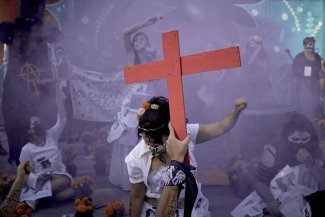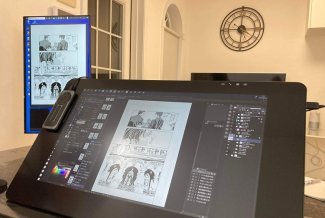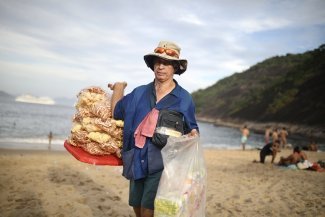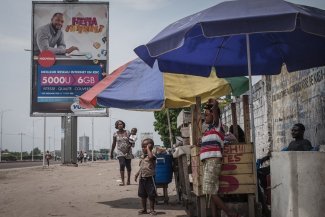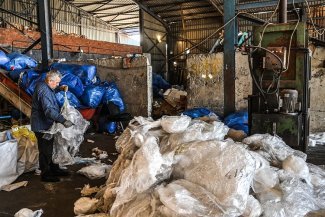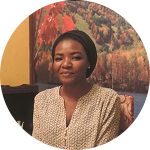
Since 2015, any girl of school age in Sierra Leone who gets pregnant has been banned from attending school or sitting their exams.
The day she found out she was pregnant was the last day of Mariatu Kalokoh’s childhood. Aged just 15 years old with only one year left until she graduated from high school, Mariatu had considered getting an abortion, but in a country where terminating a pregnancy is illegal, her close friends warned her not to risk her life.
So she decided to keep her baby. Her mother threw her out of the house and at school, her classmates refused to sit next to her. It was all too much for Mariatu. “I felt ashamed and I stopped going to school,” says the 20-year-old, whose daughter is now aged five.
In Sierra Leone, there are tens of thousands of girls like Mariatu. And since 2015, any girl who gets pregnant has been banned from attending school or sitting their exams. The government says the measure protects impressionable teenage girls from following their wayward peers; activists say it violates their human rights.
Last year Equality Now, the international women and girls’ rights NGO, joined local organisations the Child Welfare Society and the Women Against Violence and Exploitation Society (WAVES) to file a challenge against Sierra Leone’s ban before the Economic Community of West African States (ECOWAS) court in Nigeria. The court heard arguments in June and a ruling is expected to be delivered in November.
“We filed [the case] on the basis that this ban discriminates against the rights of adolescent girls,” Equality Now programme officer Naitore Nyamu tells Equal Times. “Prohibiting young adolescent girls from attending school not only jeopardises their right to an education but numerous other rights as well.” The Sierra Leonean ministries of gender and education failed to respond to our requests for comment.
Although a previous administration announced the policy, campaigners are disappointed that the current president, Julius Maada Bio, has kept the ban in place. President Bio has strongly advocated for girl child protection since he was sworn in last April. In February 2019, he declared a ‘rape emergency’ and vowed to strengthen laws to punish perpetrators of sexual violence. His government has also announced free education for all to reduce school dropout rates. However, President Bio remains unmoved on reversing the pregnancy ban. Although there is very little data on the topic, Equality Now estimates that tens of thousands of girls could be affected by the ban.
A bitter legacy
A small west African country with a population of approximately 7.5 million people, Sierra Leone has one of the highest rates of teenage pregnancy in the world, with the United Nations Population Fund (UNFPA) estimating that 28 per cent of girls aged between 15 and 19 have been pregnant or given birth at least once.
The number of pregnant teenagers in Sierra Leone exploded following the 2014 west Africa Ebola crisis, which killed over 11,000 people in the region, including close to 4,000 people in Sierra Leone. Many girls were orphaned by the virus, leaving them vulnerable to exploitation and sexual abuse from relatives and sometimes even their teachers. UNFPA says that some 14,000 girls became pregnant during the Ebola period, some as a result of transactional sex, but many others as a result of rape. Women and girls in Sierra Leone face extremely high levels of sexual violence – a legacy of the weaponisation of rape during the country’s bloody civil war (1991-2002). Some young girls even end up marrying their rapists, as pregnancy outside of marriage is still a huge taboo in Sierra Leone.
About 4,000 rape cases were reported in 2017, according to Rainbo Initiative, a local NGO providing free care to survivors of sexual and gender-based violence. Last year, those numbers doubled, says Rainbo director Daniel Kettor, thanks mainly to increasing numbers of women and girls coming forward to report their assaults. Kettor partly attributes this to the impact made by NGO advocacy on the issue, but also to the people’s confidence in President Bio’s administration.
Most of the girls affected by the school ban come from low-income families. Stopping them from taking classes and exams, Nyamu says, punishes them unfairly when, in most cases, they are victims themselves.
Mariatu, for example, comes from a poor household. The boy who impregnated her gave her money to pay for textbooks and lunch. Unequal power relations in patriarchal Sierra Leone means that while boys can offer girls money, girls can offer the one thing they feel they own: their bodies. But it’s a dire lack of sex education, at school and at home, that makes the consequences of teenage sex so devastating.
“That is something parents fail to do,” says Rugiatu Sillah, a coordinator with Girl Child Network, a local NGO advocating for children’s rights. Sillah works with girls in Lunsar, a mining town to the east of Freetown that is a hotspot for teenage pregnancies because of its combination of popular schools full of young girls and mining-related businesses staffed by young male workers.
Yet parents in conservative Sierra Leone often refuse to face the reality that their children are curious about sex. Speaking to young people about contraceptives is taboo, and whenever parents do attempt to educate their children, they often speak in simplified metaphors. “They say things like: ‘If you take Sorie and put am for Isatu, you go get pikin,’” Sillah relates in Krio, Sierra Leone’s national language (Sorie and Isatu are male and female names used to refer to male and female sex organs).
How does the ban affect girls?
Sierra Leone is not the only African country to ban pregnant teens. Equatorial Guinea and Burundi have similar policies, and two years ago, President John Magafuli introduced a similar policy in Tanzania that even went as far as to bar their return to school.
But Anita Koroma, the country director of Girl Child Network, says the ban is not only discriminatory, it is actually unnecessary: “The girls already feel too ashamed and discouraged to go back to school in their state,” she explains.
Those who, like Mariatu, carry to term face huge risks: Sierra Leone is the most dangerous place to give birth in the world, according to Unicef, with 46 per cent of adolescent girl deaths due to childbirth complications. A shortage of skilled health workers and poor health infrastructure adds to the high maternal mortality rates. Ban or no ban, life is incredibly tough for pregnant girls.
So what can be done to tackle this? What girls – and boys – need, Koroma suggests, is comprehensive sex education in schools. Improvements to this end are already included in a 2018 national strategy document to reduce teenage pregnancy and improve child health, but weak enforcement of laws and poor policies are a major issue. Teen mothers in the meanwhile need to be encouraged. “We want the government to lift the ban and leave the girls alone because they already don’t feel free. They feel like they’ve let their peers down,” Koroma says.
Some activists are calling for practical solutions – ones that take the fact that teenage pregnancy is seen as the highest expression of immorality for girls in Sierra Leone into account. The idea of a pregnant girl sitting in class is offensive to many, women’s rights activist Alimatu Dimonekene explains to Equal Times. Dimonekene says she personally funds the education of several teenage mothers but acknowledges that it will take a while for most people to accept pregnant girls in school. “The stigma that comes with being a girl child is unbelievable. Not so long ago 12-year-olds were getting married. We need to gradually bring the government and society to the reality of what modern-day norms are showing us. It’s an intricate situation but we can find a balance,” the activist says.
Special centres for pregnant girls
The balance the Sierra Leonean government provides is part-time, special centres for pregnant girls. The back-to-school programme for teen mothers was launched in 2015 and is supported by the UK’s Department for International Aid (DFID), the United Nations and Sierra Leone’s Ministry of Education. The curriculum of these special schools includes personal mentoring and a two-hour study period three days a week.
For 17-year-old Kadiatu Turay (not her real name), the centre offers young mothers a chance to continue learning, although she is currently out of education. Kadiatu dropped out of school to have her baby months ago and is now ready to continue studying. Sitting in her home in Lunsar, Kadiatu wraps her two-month-old son in a multi-coloured blanket and cradles him to her chest protectively. She misses her friends. And she especially longs for her social studies lessons. “I love studying about my country,” she says wistfully.
But some say the centres don’t offer teenage mums a proper education. “It still feels discriminatory because not allowing them to be among their peers is like you saying they are the bad ones in the society, like saying they are not fit to be where the normal ones are,” says Mariatu, angrily.
The hours, she points out, are inadequate and girls still can’t sit for national exams. And although the girls are free to leave the centres and return to proper schools after giving birth, social workers say they rarely do.
The ECOWAS court is expected to rule on the case against the Sierra Leonean government in November. Nyamu from Equality Now is optimistic that the ban will be lifted. But she also knows the fight doesn’t end there. “We have a post-litigation strategy, whichever way the court decides. We will still continue advocating for the rights of girls, for their education and for all of them to have access to it.”
Mariatu is now enrolled in a different school and will sit national exams this year. She returned to school after landing herself a scholarship, courtesy of Peagie Foday (née Woobay), a former teen mother working to encourage pregnant girls to stay in school. Mariatu currently works as a waitress part-time to pay for her daughter’s education. She wants to get a degree so that she can become a banker.
But Mariatu says she still worries for girls who are now in the situation she once found herself; girls who may not be inspired to go back to school after childbirth. “President Bio, look into this,” she implores, passionately. “If you stop a girl from going to school you have jeopardised her future. With her education she will be able to take care of her kid and get a good job. She will be independent.”




